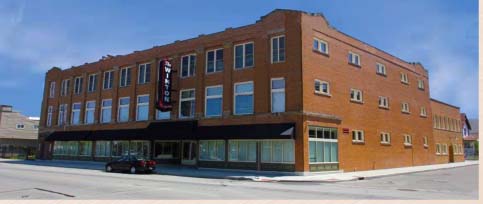Permanent Supportive Housing Featured on WCPN
 Solution: Permanent Supportive Housing
Solution: Permanent Supportive Housing
David C. Barnett had a nice story on WCPN yesterday regarding the new permanent supportive housing projects. We appreciated hearing from a resident "Joan" who lived at one of the apartments. We know many people who have been on the streets for years living in these properties. We have a former vendor who has a huge issue with alcohol living in the Broadway neighborhood. His former residence was a tent next to the Cuyahoga River in Cleveland.
We have 560 units now in Cleveland spread out throughout the community. These buildings are turning desolate and deserted corners of town into vibrant neighborhoods. These apartments are great for a group of people in our community who need the help. The staff go out of their way to keep evictions down and work with the men and women. This is part of the 100,000 units campaign featured on 60 Minutes over the weekend. We have a friend of the Coalition who slept in a box car over near 2100 Lakeside Shelter for years. He would come to our meeting and rail against the shelters and services. He complained about staff mistreatment and stupid rules that the shelters implemented. He got into one of the first housing units and took his loud voice to establishing a tenant council in the building. He has prospered over in the building and seems to be doing well. It was exactly what he needed.
These are all beautiful buildings and in Cleveland we have opted for new construction for most of the Permanent Supportive Housing. They are great places to live and wonderful examples of what we can do as a society to improve the lives of homeless people. We should be proud that we have done a great job in targeting these units to the people who have been on the street the longest. It should be obvious, but Irene Collins' words are exactly on target,
"It’s much less expensive than having someone out on the streets where any doctor appointment would be at the emergency room, or checked into a psych rehab hospital, which is very, very costly. The cost of keeping someone in a shelter is a whole lot more than the cost of keeping someone in some kind of permanent housing situation where they are a lot more stable."
My concern is that these units are being over sold. They will not end homelessness. They are not a silver bullet, and I am not sure it is good idea to exclude so many who could benefit from these services. There are many large families that are going to cost the community millions of dollars if they spend a long period of time homeless, but the PSH programs are reserved for single adults at this time. They will not even replace one shelter bed in Cleveland. We have as society neglected affordable housing for 30 years so the 560 units will not have much of an impact on homelessness. We have lost 10,000 units locally from neglect and properties falling down from age. We need to develop 1,000 units a year for the next 10 years and we could start closing the shelters. Remember when they opened the CMHA Housing Voucher waiting list in 2011, 64,000 unduplicated people tried to get on the list in Cleveland.
We also have to remember the high cost of the PSH units for the future. We have to pay for the supportive services and the 24 hours of staff care provided for tenants in the building. We need to pay most of the rent for these individuals for probably the rest of their lives. They will most likely make somewhere between $0 per month to around $700 for disability assistance. This means that 50-100% of the tenants rent will need to be picked up by the government for the rest of their life. These are expensive for the community to operate and we do not have a dedicated revenue source for the rent and support services.
Finally, there are those who keep saying that these projects save the community money. This is true, but it does not save the shelters any money. It saves law enforcement, health care providers, mental health community, and hunger programs money. It is much cheaper to house 400 people in a dorm room with a few staff to watch them when compared to the maintenance and case management for an apartment building. Walls and privacy adds costs to any project. The problem is that the hospitals, jails and mental health agencies are not going to take the savings and turn it over to the homeless programs. They are going to spend the savings of the 570 people currently in the PSH on other poor people. MetroHealth is not going to reward 2100 Lakeside shelter with the $50,000 they saved on our friend who lived in the box car from his frequent trips to the emergency room every year. They are going to spend it on the other 100,000 poor people they see every year.
Housing First is a great concept with some wonderful properties, but there are plenty of families, veterans, young people who could benefit from being in these units but do not qualify. Even though families are the fastest growing population in the community, they do not typically qualify for these beautiful apartments.
Brian Davis
Posts reflect the opinion of those who sign the entry.
